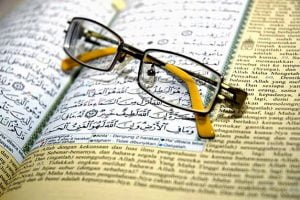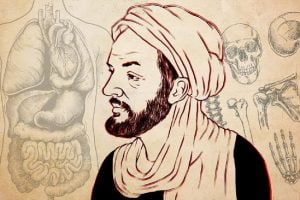
The Empirical tradition means the habit of observing, understanding and inferring about reality. Science is the result of empirical tradition. The very strong empirical tradition will produce a rich and variety of scientific conclusions. The Empirical traditions in the Qur’an is not merely lead to scientific conclusions, but deliver a Muslim — using empirical logic or the logic built on facts – to increase and and enhance a Muslim’s faith.
Islam encourages Muslims to understand reality by observing, thinking about, or even experimenting with using reality as an object of study. Thinking in an Islamic perspective is an attempt to understand reality more systematically to produce conclusions in the form of more organized knowledge about reality. If a person claims to think, but does not rely on an empirical reality, then what he perform could no be categorized into thinking, but merely fantasizes – or at least – only pseudo thought; in which it will not lead to conclusions in the form of organized, measurable, repeatable, and verifiable knowledge.
If someone claims to think, but not about an empirical object, it is not a thinking process, but fantasizes. The so-called Islamization of science is often trapped in efforts to study something that is not empirical, which cannot be reached by the human senses, such as the study of the physical and chemical structure of the genie, the heat from hellfire in a certain time unit, and the degree of hypocrisy. The study of objects that are not empirical will not lead to the formulation of scientific theories, which will give birth of technology but will only lead to a long debate that will not end. Pervez Hoodbhoy (1996) made a sharp critique of the Islamization of science in Pakistan, because Islamization in Pakistan at the time of President Ziaul Haq was more about non-empirical matters. While the Qur’an itself instructs humans to understand various issues that are empirical in everyday life.
Many verses of the Qur’an command human beings and call to understand the facts as an empirical reality. Among the verses are:
So let man observe from what he was created? He was created from a fluid, ejected, emerging from between the backbone and the ribs. (QS ath-Thâriq [86]:5-7).
Then do they not look at the camels – how they are created? And at the sky – how it is raised? And at the mountains – how they are erected? And at the earth – how it is spread out? (QS al-Ghâsyiyah [88]:17-20).
And a sign for them is the night. We remove from it [the light of] day, so they are [left] in darkness. (QS Yâsîn [36]: 37).
Empirical Reality and the Process of Faith
Thus the verses command humans to observe carefully and deeply a reality. There are still hundreds of other verses that contain the same command meaning. By observing the facts that are sensed and by sound and smart intellect, humans will understand that the universe and human life have limitations. He is interdependent each other. Humans are very dependent on the availability of food that grows from nature; and nature does not stand alone but needs and complement each other. In a biological cycle, for example, it is illustrated that humans need animals to meet the needs of animal protein. Animals need grasses that grow in nature. Grasses need fertile water and soil. Animal droppings over a period of time will help fertilize the soil. Thus the life cycle is interdependent and requires each other.
Something that is dependent and need each other means that they are weak; and surely its existence has a beginning, not eternal something (azali). Something whose existence has a beginning, there must be a creator, it might not be automatically. The creator of course will be different from the one created. If what is created is material with its perceived characteristics, such as having color, odor, motion, size, unit, and change; then the creator does not have material characteristics. Because it does not have material characteristics, whereas the human eye is a part of material objects that are merely able to reach the material, then humans by themselves will not be able to see the Essence of this Creator on the surface of the earth today. In the next life which has no material dimension, then of course humans will witness the figure and the motion of the Creator. Humans will talk and dialogue with the Greate Creator, where humans will be held accountable for all their actions.
Observing the empirical reality will also reject the view that what is in the universe is a continuation of what was before, or a change from one form to another, such as the view of the well-known theory of evolution. For example: changes from fruits that are still young, old, and ripe; a human being changes from a baby, children, adolescents, adults, then old and dead.
If the occurrence is merely a change from one form to another, it means that the materials have the strength and ability according to their will. In fact, empirically based on the facts that are sensed, humans, and objects must be subject to something that is non-material. For example: when a frog undergoes a process of change from tadpoles to adult frogs, it turns out that as an adult he cannot return to being a tadpole. Humans when changing from babies to old and die, it turns out he can not return to being a teenager, even though adolescence and youth are the “golden age” for one’s life, where he wants to maintain that period as long as possible.
Correspondingly, based on an understanding of empirical facts, it also appears that the occurrence of objects in the universe is not due to meeting one material with another, which then gives birth to new material. Someone may say that the occurrence of a fetus in a woman’s uterus due to the meeting of sperm with the ovum, but that meeting requires a certain amount and structure. The amount and structure are not part of the material. Therefore, the formation of a fetus in a woman’s womb is not merely a meeting between sperm and opum, but requires a certain structure (wadh’un makhsusun) in the form of volume, speed, and certain conditions – traits that must be present, but not included material. It means the formation of a fetus requires something that is not material. This shows the existence of creation by the Great Creator which does not have the material properties.
Then who is really the Great Creator who does not possess the material characteristics? Factually and logically, the creator who governs, regulate and controls the universe & life must possess non-material properties. If it is said that the creator is one, then the “one” of Creator is different from the “one” of material which has a unit of volume, weight, and length, motion and changes. Therefore, the Allah SWT as the Great Creator does not have a unit of volume, weight, and length; nor does he has other material properties, such as motion and change. The creator also cannot be weak and dependent on matter. In Islam the name of the Great Creator is mentioned in the Qur’an, namely Allah SWT.
Therefore, Islam recognizes the existence of naqly theorem, namely the evidence of the existence of Allah SWT written and taken from the Al-Qur’an, and the aqly theorem, namely the results of observing and understanding the facts that are logically observed and observed by using common sense and intelligence as the potential possessed by each human. The use of the naqly proposition depends very much on the faith or as a logical consequence of the faith; while the use of the aqly (empirical-logical) proposition as a process for faith.
Thus, the empirical tradition – or the habit of understanding facts logically – is strong enough in Islam, which leads to the acquisition of knowledge and science while it also strengthen the Islamic faith.
Reference
Ibrahim bin Muhammad Al-Baijuri, Tuhfatul Murid ala Jauharrat Tauhid (Without Year, Place, and Publisher.
Muhammad Husein Abdillah, Ad-Dirosah fi Fikril Islamy (Beirut: Darul Ummah, 1990)
Taqyuddin Ibnu Muhammad, Asy-Sykhasiyyah Al-Islamiyyah, Al-Juz’ul awwal (Beirut: Darul Ummah, 1994)
Pervez Hudbhoy, Islam and Science, Religious Ortodoxy and the Beatle of Rationalit, Indonesian edition, translated by Sari Meutia (Jakarta: Mizan, 1996)




alhamdulilah sangat membantu